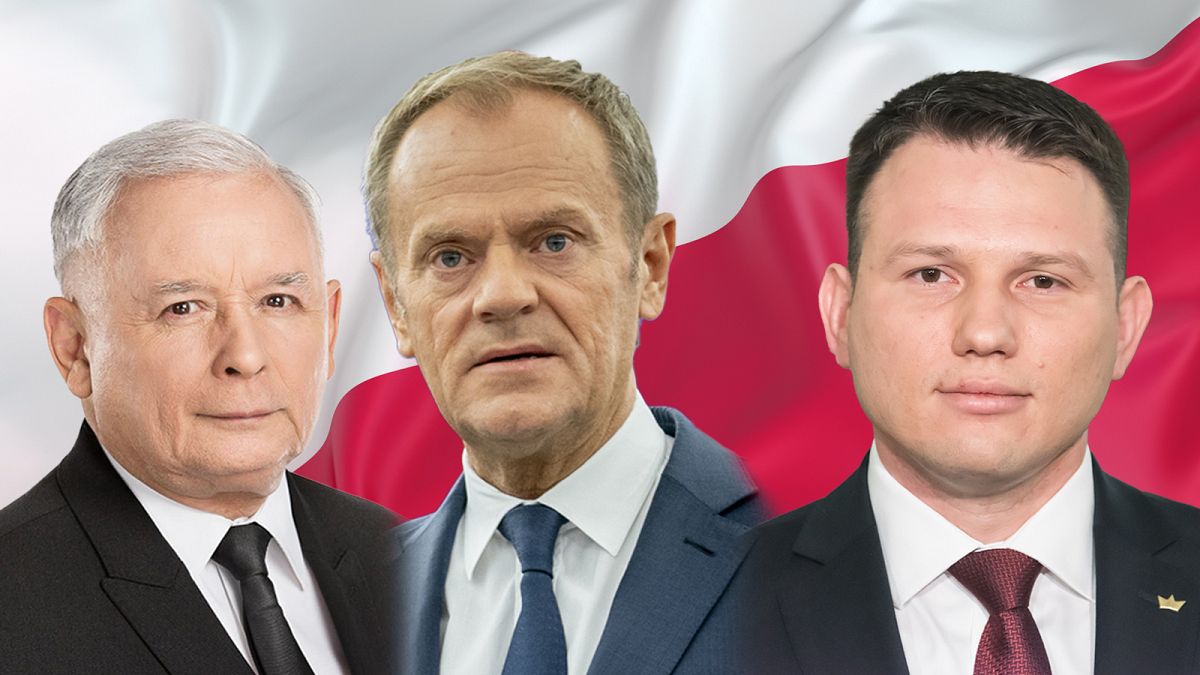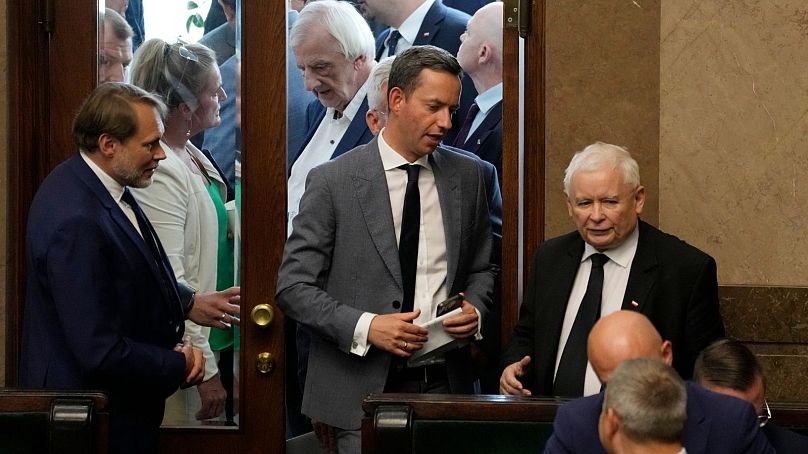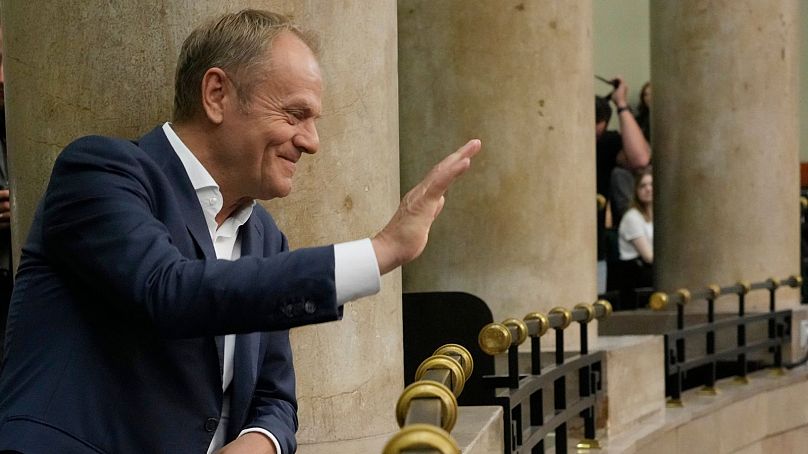One month before Poland’s parliamentary election on 15 October, Euronews looks at how the race might shake up the country’s politics through two new risky coalitions.
On 15 October, Poland will be holding a parliamentary election that could reshape the face of the country’s politics, as the ruling party PiS - also known as Law and Justice - has lost significant support since the last election four years ago.
While in 2019 PiS won 43.6% of the vote, the party is now several percentage points below that level of success at 38% as of 9 September, according to the latest POLITICO poll.
Trailing behind Pis is Donald Tusk’s Civic Coalition party - Koalicja Obywatelska - with 30% of the vote and the far-right Confederation Freedom and Independence - Konfederacja Wolsność i Niepodległość - with 11% of the vote.
The current polls suggest that PiS, which has been ruling Poland since 2015, might look for a coalition partner to form the next government as it fails to reach an overall majority, though it’s still unclear where it will find one.
This election will be crucial for the future of Polish politics, Anita Prazmowska, a professor at the London School of Economics and Political Science (LSE) and an expert in Polish politics and history, told Euronews.
“It does matter a lot because those who are critical of PiS are absolutely desperate for change, they feel they are living now in a state that is very close to fascism,” she said.
“They don’t like to use that word because it’s associated with Nazis and its use in Poland would actually discredit your arguments. But I attended a conference last month and I said ‘this is really, quite frankly, a fascist programme’.”
In Poland, the government is a nationalist and populist one, Prazmowska said, “and populism is all about the state redefining the role of the state, which is why I call it fascist.”
The PiS has called for a controversial referendum on migration which will be held alongside the parliamentary elections on 15 October, a move that critics has described as an attempt to rally voters around the government. The party's tough stance on migration previous helped it take power in 2015.
A redefinition of Polish politics through coalitions
According to Prazmowska, the “energy to change” the face of Polish politics might come from the new coalitions that could be formed during the race.
“The ruling party is very aware that Jaroslaw Kaczynsky [leader of PiS] is reaching an age where he’s not as good in wheeling and dealing and dividing and attracting politicians as he was before,” Prazmowska said.
“So there is a sense that whatever happens, whatever the electoral results are, there’s going to be a prolonged period of negotiation. And these negotiations might lead to a redefinition of policies, not governmental policies as such, but the need for coalitions.”
Kaczynsky, who served as Poland’s prime minister in 2006 and 2007 and is now deputy prime minister, is currently 74 years old.
But Prazmowska said that a question remain over what the two big groups in the Polish electorate - people who voted for PiS and those who supported the centre parties - “can put together enough votes to win these parties a majority, because neither side is certain of winning,” she told Euronews.
Any real change in the country’s politics will depend on the coalitions that PiS and Tusk’s Civic Coalition party will seek, Prazmowska said, whether these will be found in the left or the far-right, like Konfederacja.
Is it possible that PiS and Tusk will strike an alliance with Konfederacja?
Konfederacja, which has got on the stage of Polish politics with extreme anti-LGTBQ+, anti-Semitic, and anti-migration stances, has significantly grown its support since the 2019 elections, when it gained only 6.8% of the vote.
One of its leaders, the 36-years-old Slawomir Mentzen, has nearly 800,000 followers on TikTok.
Its rising importance in Polish politics makes it so that the party might be able to play kingmaker in the next election, with a possible coalition with PiS or Tusk’s Civic Coalition party being discussed by experts.
All three parties currently play down the option of a coalition between them. But Prazmowska said that this might be part of a strategy to keep their electorate happy before striking an alliance after the election.
While a coalition between PiS and Konfederacja might seem more ideologically likely, in their respective programmes the two parties “don’t have anything in common,” Prazmowska told Euronews.
“Konfederacja is against strong state authority, against taxation, against state intervention, against the power of the state. And PiS is actually very strongly interventionist, its policies have been populist on the basis that the state will provide to its citizens.”
While PiS supports nationalist policies and its openly anti-immigration, the Confederate party’s “calling card,” Prazmowska said, has been “anti-Semitism.”
One of the policies that made Kaczynski popular, the professor said, was raising the number of annual payments received by pensioners in the country from 12 to 13 and offering higher payments to families. But Konfederacja says that these policies need to be scrapped “because governmental money has to be withdrawn and the government has to stand back.”
But while their programmes don’t suggest a potential basis for collaboration between the two parties, Prazmowska said that what could unite them is that Konfederacja cannot win on its own - and PiS is likely to need their support.
“Konfederacja could strike an alliance with other right-wing parties, but it would still not have enough deputies in Parliament,” Prazmowska said.
“So they might still get into a tactical agreement with PiS, but maybe after the election - so that both parties hold on to their identity.” According to the professor, it’s likely that PiS would place a Konfederacja politician either as prime minister or the Ministry of Treasury after the election.
Another coalition, led by Tusk
There’s a chance that another coalition would form, led by Tusk and the Citizens Platform. “It’s wide open when it comes to them,” Prazmowska said. “Will they move towards the left and the peasant party - which has recently been growing?”
This would be an “uncomfortable” coalition, Prazmowska said, because Tusk is seen as an EU man and the Peasant Party hasn’t been friendly to the European Union.
This potential coalition too, Prazmowska said, will be done after the election. “It’s really anti-democratic when you think about it,” she said. “There is such a sense of anxiety and insecurity in Polish media.”


